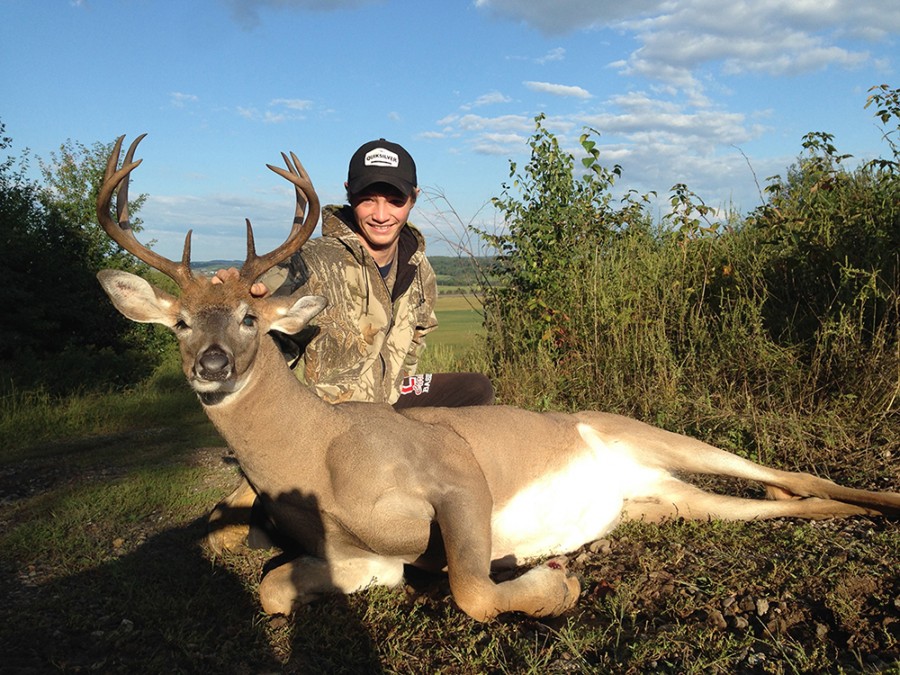Hunter harassment bill now on to Gov. Scott Walker for approval
UW-Eau Claire student and staff weigh in on hunter harassment
More stories from Angel Vang
Photo by Angel Vang
In 2014, Chase Stoffel successfully hunted an 8 point whitetail buck in Chippewa falls, WI.
The state Assembly and Senate passed a new hunter harassment bill to prohibit the harassment of hunters after an incident in 2014.
Eric Kasper, assistant professor of political science and first director of the new UWEC Center for Constitutional Studies, said the new hunter harassment bill will create a separate section to the existing hunter harassment law that will broaden the definition of what’s prohibited, or counts as harassment.
The bill includes photographing, videotaping, maintaining in visual proximity with intention to impede or obstruct someone who is lawfully hunting, fishing, trapping or other related activities, Kasper said.
The hunter harassment bill stemmed from the Wolf Patrol, an animal rights group, Kasper said. They protested in Wisconsin and other places by approaching hunters and creating distraction so the hunter couldn’t hunt or photograph wolves.
“They had records of the hunters to show that these are the sorts of things that could be done now but will be prohibited under this new bill should it become law,” Kasper said.
Kasper said the bill has passed the state senate and state Assembly and is now waiting for Gov. Scott Walker’s decision.
“If approved,” Kasper said. “The bill will expand prohibitions that can be put on what people can do when they approach hunters including when they approach them and what they do around them when they’re hunting on public lands.”
The bill applies only if the person who is engaged in hunting activities does so lawfully. If what they’re doing is deemed to be illegal hunting, then this law wouldn’t apply, Kasper said.
“It does not infringe on people’s first amendment rights,” Kasper said. “It’s protecting hunters.”
However, Kasper’s position is unsettled. He said the issue of whether or not the legislation is constitutional under the First Amendment is unsettled and differs between both opponents and supporters. Opponents claim it would infringe on protestors’ rights, Kasper said, but supporters profess the bill is a reasonable regulation to protect legal hunting.
Ellen Mahaffy, associate professor of communication and journalism, said she understands there are hunters who will use their weapons for protection.
“There are hunters, and those who have weapons, who have that respect for the weapon, but there are always those fringe people that do not,” Mahaffy said. “So then our laws end up having to do with the fringe rather than the overall general feeling of how things should be treated.”
In terms of what is acceptable in public vs. private property settings, Mahaffy said there is a difference. People have the right to photograph controversies or fights occurring in public property unless it’s private property, such as malls, stores or restaurants, Mahaffy said.
“Anyone who is in public view are subjected to those potential privileges,” she said.
Authorities can confiscate equipment, but may not delete files or photos as it is a violation of a person’s rights, Mahaffy said. Cellular devices are changing what’s public and private because people have their our own personal devices.
“The true nature of cellular devices might be more so to record personal history rather than to document incidents that are happening,” Mahaffy said. “However, in reality, you still have rights to your things.”
Chase Stoffel, sophomore biology student, has been hunting from a young age, he said. He hunts in the area of Chippewa Falls and Tilden, Stoffel said.
Stoffel said he has never experienced hunter harassment, but said if someone is doing illegal acts, those acts should be pursued.
“It’s always good to be monitored to some extent, but when you’re doing everything legally it gets annoying,” Stoffel said.
The bill is more targeted toward hunters who use dogs because animal rights activists believe the dogs are mistreated, Stoffel said.
Stoffel said he’s unsure about the bill’s effectiveness. While it may promote safety and privacy for hunters, he said, it’s threatening the hunting experience for hunters as well.

